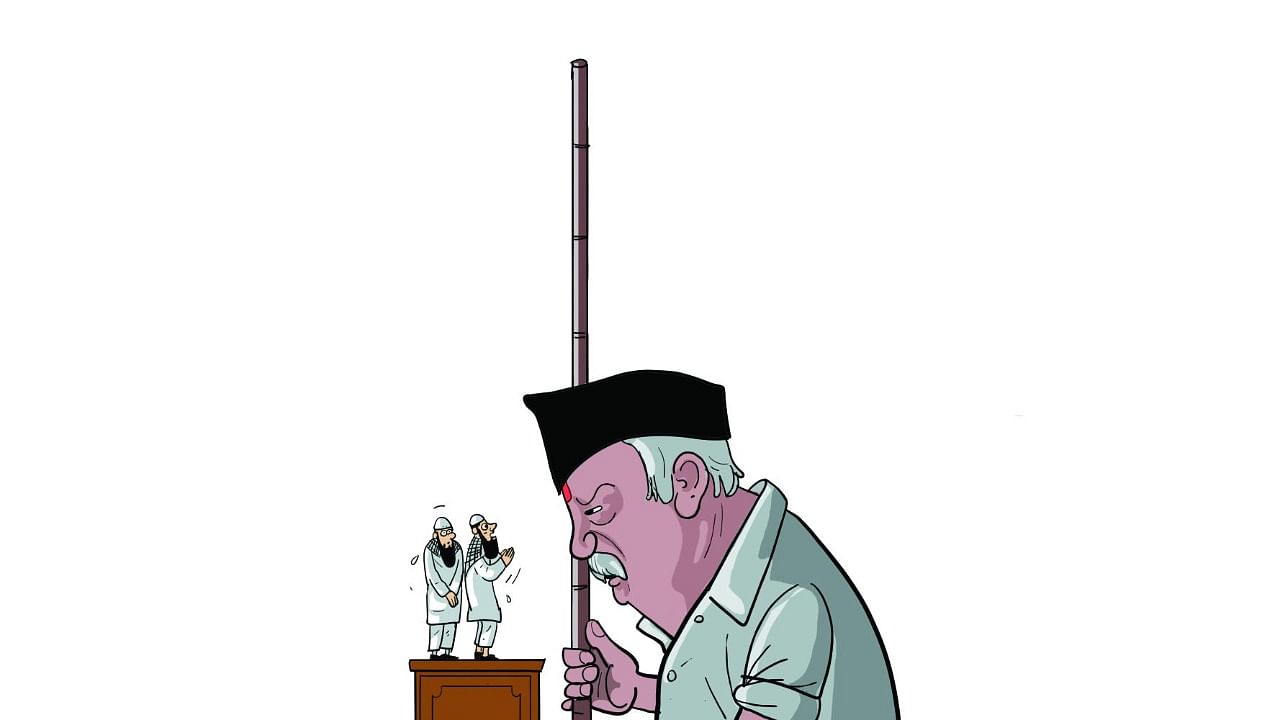
The recent meeting between Rashtriya Swayamsevak Sangh’s chief, Mohan Bhagwat, and some distinguished Muslims, and his subsequent clarion call to put an end to ‘Varna’ and ‘Jati’ systems, have stirred a storm in a tea cup. Shock, surprise and disbelief are some of the expressions, which possibly sum up most of the reactions of archetypal detractors of the Sangh Parivar to these developments.
Former Chief Election Commissioner, S Y Quraishi, was among the five prominent Muslims, who met the ‘Sarsanghchalak’ on August 22. Writing in a multi-edition English daily later, Quraishi clarified that it was entirely an initiative of the five of them, “with common concerns about the insecurity of the Muslim community and a belief in the process of dialogue”.
The Indian public discourse is saturated with naysayers with a vested interest in keeping the Hindu-Muslim divide alive. To maintain their vice like grip on the Muslim masses, ‘left-liberals’ have been successfully presenting the RSS as some sort of an ogre, waiting to devour them.
Exchange of views helps to clear misconceptions and reach an understanding on issues of common interest.
However, those who have built political careers over decades on the tension between Hindus and Muslims would obviously see such interactions as a threat to their existence.
The RSS, Mahatma Gandhi and several others, including many Muslim leaders, opposed the Partition of India, and strived for an Akhand Bharat. They were aware of the contentious issues between the two communities, but were hopeful of resolving them after the departure of the wily British.
After independence, the communists, who had worked for the division of the country, managed to become the high priests of ‘secularism’ and since been pontificating on who is ‘secular’, and who’s not!
The irony of robbers donning police uniforms have been the bane of Indian social and political life, leading to disastrous consequences. The antidote to this poisonous virus breeding confusion is dialogue. As an enlightened leader, Mohan Bhagwat realises it.
Speaking at the Vijayadashami rally in Nagpur, Bhagwat said “there is scare-mongering that, array Sangh wale marenge (Sangh will target you)”. The dialogue has in fact been going on for some time. On an earlier occasion, in July last year the RSS chief had asserted that “the only solution to Hindu-Muslim conflict is dialogue, not discord”. Addressing another public function, he had urged Muslims not to get “trapped in the cycle of fear that Islam is in danger in India”.
Bhagwat hasn’t said anything new. He, in fact, has just reiterated what Sangh has believed in and practiced for long.
His predecessor, Kuppahali Sitaramayya Sudharshan (Sarsanghchalak from 2000 to 2009) had started a dialogue with Muslims and Bhagwat is following in his footsteps. In RSS Shakhas, none is ever asked about his religion or caste.
What sustains democracy and secularism in India, particularly when most of the neighbouring countries are completely bereft of plural ethos? Constitution? No. A constitution is not even worth the piece of paper on which it’s written, if it’s not in sync with the culture and ethos of the people it’s supposed to serve. India’s constitution is live and vibrant because it mirrors the ethics and virtues Indians believe in.
For aeons, bulk of Indians, in their personal and public life, are guided by ever evolving ‘Sanatana Dharma’ that places no value on uniformity, but emphasises on harmony. It allows total freedom to individuals to choose their deities and modes of worship. Use of force in matters of faith is abhorred.
The RSS considers itself as a custodian of these pristine traditions and frequently comes in conflict with creeds, which claim monopoly over the ‘ultimate truth’ and resort to violence and other unethical means to push their agenda of hate and divisiveness.
(The writer is a former BJP MP and a senior columnist)
Sangh Parivar’s outreach
2019, August 30: RSS Chief Mohan
Bhagwat meets Jamiat-e-Ulema-e-Hind
leader Maulana Syed Arshad Madani
2021, September 6: Bhagwat meets Muslim intellectuals in Mumbai
2022: July 3 BJP National Executive Meeting, Hyderabad.
Prime Minister Narendra Modi asks the party to reach out to “Pasmanda Muslims” – the Dalit and backward section of the community.
August 22: Bhagwat meets 5 members of Muslim community...
S Y Quraishi, former Chief Election Commissioner
Najeeb Jung, former Lieutenant Governor of Delhi
Shahid Siddiqui, journalist
Saeed Shervani, hotelier
Lt Gen Zameer Uddin Shah (retd), former
Vice Chief of Army Staff.
September 22: Bhagwat visits a mosque in Delhi, meets Umer Ahmed Ilyasi, chief of All India Imam Organisation.
RSS chief says “DNAs of all Hindus and
Muslims are same”.
October 7: Bhagwat says ‘Varna’ and ‘Jaati’ (caste)
systems are things of the past and should be forgotten.